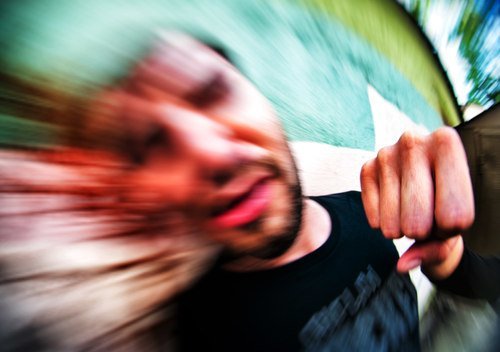Under CRS § 18-3-203, you commit the Colorado crime of second-degree assault if you intentionally or recklessly cause injury to another person with a deadly weapon. A conviction is a class 4 felony punishable by a prison sentence of 5 to 16 years.
Second-degree assault is less serious than first-degree assault (CRS 18-3-202), which typically results in severe bodily injuries. And second-degree assault is more serious than third-degree assault (CRS 18-3-204), which typically involves negligent accidents.
In this article, our Denver Colorado criminal defense attorneys will explain:
- 1. What is 2nd-degree assault in Colorado?
- 2. What are the best defenses?
- 3. What are the penalties?
- 4. Related offenses

CRS 18-3-203 prohibits intentionally or recklessly causing injury to another person using a deadly weapon.
1. What is 2nd-degree assault in Colorado?
The Colorado crime of second-degree assault comprises the following eight behaviors.1
- Intentionally causing an injury with a deadly weapon,2
- Recklessly causing a serious injury with a deadly weapon,3
- Intentionally hurting someone to prevent a police officer, firefighter, or EMT from working,4
- Intentionally causing someone else to suffer a physical or mental impairment. This includes making them unconscious or drugging them without their consent,5
- Knowingly using physical force against an emergency responder, prison worker, or court worker,6
- Trying to infect an emergency responder or prison worker by using bodily fluids,7
- Causing a serious injury while trying to cause a less serious injury, and8
- Intentionally hurting someone by suffocating or strangling them.9
Examples of second-degree assault in Colorado are:
- Marv pistol-whipping his boss after getting fired from his job,
- Paul shoving a police officer, and
- Lacey pushing Mark down a short flight of steps, causing him to suffer brain damage
Bodily injury vs serious bodily injury
A bodily injury is “physical pain, illness, or any impairment of physical or mental condition.”10
In contrast, a serious bodily injury involves substantial risk of death. It can cause serious and permanent disfigurement and can involve the impairment of a body part or an internal organ. A serious bodily injury can also include broken or fractured bones or burns in the second or third degree.11
Non-serious injuries tend to be charged as second-degree assault under CRS 18-3-203. Serious bodily injuries tend to lead to first-degree assault charges, which may carry twice the prison time as second-degree assault.
What is a deadly weapon?
In some cases, the use of a deadly weapon is a big part of a second-degree assault charge. A deadly weapon can be a:
- Firearm, even if it is not loaded,
- Knife or another blade,
- Bludgeon or club, including a baseball bat, or
- Anything that can be used to cause death or a serious bodily injury.12
Example: Claire is driving on the highway. She recklessly takes her eyes of the road for over ten seconds to do her makeup. She causes a car accident that paralyzes Fred. The car in this assault case could be a deadly weapon. Claire could be charged with second-degree assault.

Self-defense is a potential defense to all degrees of assault criminal charges.
2. What are the best defenses?
There are numerous legal defenses against a second-degree assault charge. Some of the most common include:
- Self-defense or defense of others,
- Lack of intent, and
- The heat of passion.
Self-defense
It can be justifiable to hurt someone to defend yourself or someone else intentionally. Proving this legal defense requires evidence that you:
- Believed someone else was about to use unlawful force against you or another person, and
- Used as much force as you believed necessary to protect yourself or that other person.
Additionally, those beliefs have to be deemed reasonable for this defense strategy to work.
Lack of intent
In most cases, second-degree assault requires intentional conduct. At the very least, it requires you to be acting recklessly with a deadly weapon. So you can defend against a second-degree assault charge by showing the injury was a negligent accident or mistake.
Heat of passion
Colorado’s statute outlining second-degree assault expressly allows for the heat of passion defense.13 This reduces a conviction from a class 4 felony to a class 6 felony – the least severe type of felony in Colorado.
Proving a heat of passion defense requires that:
- The victim did something that was highly provoking,
- That provocation would have created an irresistible passion to act in any reasonable person, and
- There was not enough time for you to calm down before you caused the injury.
3. What are the penalties?
Second-degree felony assault is a class 4 felony and also a crime of violence (COV) (in most circumstances). As a COV, second-degree assault carries mandatory sentencing of five to 16 years in prison. This is harsher than the presumptive class 4 felony penalty range of two to six years. The judge can also impose a fine of $2,000 to $500,000.
But if you can prove that you were in the heat of passion during the assault, the case becomes a class 6 felony. The penalties are between 12 and 18 months behind bars and/or $1,000 to $100,000 in fines.
Even a reduced felony charge is serious, though. A conviction for second-degree assault puts a felony on your criminal background. The blemish can impact your Second Amendment rights. It can also make it much more difficult to get a job.14
4. Related offenses
Other criminal offenses that are often filed with Colorado assault charges are:
- Menacing (CRS 18-3-206). This makes it a crime to make someone afraid that they are about to get seriously hurt,15 and
- Domestic violence (CRS 18-6-801). This can enhance the sentence of someone accused of second-degree assault. Domestic violence requires an intimate relationship between the alleged victim and the defendant.1
Legal References:
- C.R.S. § 18-3-203.
- C.R.S. § 18-3-203(1)(d).
- C.R.S. § 18-3-203(1)(c)-(c.5).
- C.R.S. § 18-3-203(1)(e).
- C.R.S. § 18-3-203(1)(f).
- C.R.S. § 18-3-203(1)(f.5) and C.R.S. § 18-3-203(1)(h).
- C.R.S. § 18-3-203(1)(g).
- C.R.S. § 18-3-203(1)(i).
- C.R.S. § 18-1-901(3)(c). People v. Lee, (2019) COA 130, 477 P.3d 732.
- People v. Martinez, (1975) 540 P. 2d 1091, 1092 and C.R.S. § 18-1-901(3)(p).
- C.R.S. § 18-1-901(3)(e).
- C.R.S. § 18-3-203(2)(a).
- C.R.S. § 18-3-202.
- People v. Rigsby, (2020) CO 74, 471 P.3d 1068. People v. Denhartog, (2019) COA 23, 452 P.3d 148.
- C.R.S. § 18-3-206.
- C.R.S. § 18-6-801.

